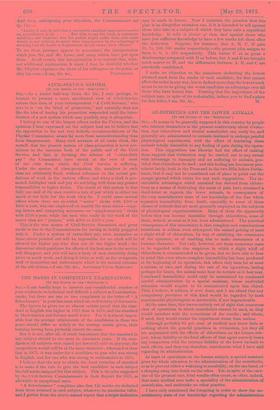THE MARKS IN COMPETITIVE EXAMINATIONS.
[TO THE EDITOR OF THE "SPECTATOR."]
Sin,—I can hardly hope to interest any considerable number of your readers in so technical and difficult a subject as Examination- marks, but there are one or two complaints in the letter of "A Schoolmaster" in your last issue which are well worthy of discussion.
The figures he gives are an almost certain proof that the stan- dard in English was higher in 1875 than in 1873, and the standard in Mathematics and Science much lower. For it is almost impos- sible that the average attainments of the candidates in these two years should differ so widely as the average marks given, their training having been probably almost the same.
But it is not, after all, of much importance that the standard in any subject should be the same in successive years. If the stan- dards in all subjects were raised (or lowered) alike in any year, the competition would still be of the same character ; whereas it is clear that in 1873, it was easier for a candidate to pass who was strong in English, and for one who was strong in mathematics in 1875.
I believe that the way to obtain the least variation of standard is to make it the rule to give the best candidate in each subject the full marks assigned for that subject. This is the plan suggested by the Civil-Service Commissioners in their Report for 1873, as allowable in exceptional cases.
"A Schoolmaster" complains also that 125 marks are deducted from those attained in each subject, whatever its maximum value, and I gather from the above-named report that a larger deduction
may be made in future. Now I maintain the paradox that this plan is an altogether mistaken one, if it is intended to tell against those who take in a subject of which they have only a superficial knowledge. It tells in favour of them, and against those who have just sufficient knowledge to have a few marks left them after the deduction. Suppose, for instance, that A, B, C, D gain 25, 75, 130, 700 marks respectively,—the present plan assigns to' them 0, 0, 5, 575 respectively. This leaves C at as great a disadvantage compared with D as before, but A and B are brought much nearer to D, and the differences between A, B, and C are practically annihilated.
I make no objection to the examiners deducting the lowest attained mark from the marks of each candidate, for that cannot affect the order in anyway, but to deduct more than the lowest mark seems to me to be giving the worst candidate an advantage over all those who have beaten him. Trusting that the importance of the subject may, in spite of its technicality, induce you to find a place


































 Previous page
Previous page